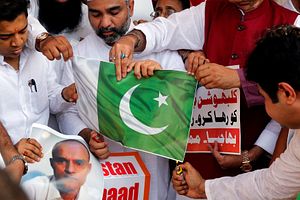Who is Kulbhushan Jadhav, a.k.a Hussain Mubarak Patel? Is he a spy, who accidentally strayed into the Balochistan territory of Pakistan, as made out by the Pakistan Army, or was he kidnapped in Iran by the Taliban, and sold to Pakistan’s intelligence agencies as stated by Gunter Mulack, a well known scholar and the former German ambassador to Pakistan?
The Iranian government has confirmed that Jadhav was doing business in Chabahar in Iran. There are indications that he was kidnapped and brought to Pakistan against his volition. If this is true, Pakistan should forthwith withdraw all the charges leveled against him and set him free.
On the other hand, if sources in Pakistan are to be believed, Jadhav had indeed entered Balochistan, where he was arrested in March 2016 and charged with stoking the Baloch separatist movement and seeking to scuttle the high-profile China-Pakistan Economic Corridor. The Pakistan Army has issued a “video confession,” where Jadhav is seen to be admitting working on behalf of India’s Research and Analysis Wing (RAW) to coordinate and organize espionage/sabotage activities to destabilize Pakistan.
A press statement issued by the army spokesperson said that Jadhav had “confessed before a magistrate and the court that he was tasked by RAW” to sabotage the CPEC projects being built wit Chinese assistance. However, confessions obtained through torture, which some suspect was used in this case, will not stand legal scrutiny in any court of law.
It is pertinent to mention here that Sartaz Aziz, adviser to Pakistani Prime Minister Nawaz Sharif, had informed the Senate chamber in December 2016 that the dossier presented by military intelligence did not have any conclusive proof against Jadhav. His statement raised hopes that Jadhav would be released by Pakistan. Later Aziz was forced to recant his statements, probably under pressure from the Pakistan Army.
There’s also a question as to why Jadhav was tried in a military court instead of a civil court. After the terrorist attack on a Pakistan Army public school in December 2014, where over 140 persons, including 130 school children, were brutally massacred, the Army Act was amended on December 2014 to extend its jurisdiction to civilians engaged in terrorist acts. The purpose of establishing military courts for trying non-army personnel was to expeditiously conduct trials and bring closure to all those cases where people have been found waging war against Pakistan, as the civil courts were found to take years to settle a case and award punishment. Moreover, in many cases, for want of evidence, these perpetrators are set free by the civil courts. It is for this reason the Pakistan Army had decided to proceed against Jadhav in a military court, rather than a civil court, so that the trial could be conducted expeditiously. Moreover, unlike the civil courts, the military court did not go through a lengthy process of collecting evidence.
In the case of the alleged Indian spy, the courts had already decided the punishment to be awarded even before framing charges against him. In contravention of the Vienna Convention, Jadhav was denied consular access. He was also not provided with any legal assistance to defend himself. Yet the court sentenced Jadhav to the death penalty on April 10, in clear violation of established laws.
Jadhav’s trial, and the subsequent sentencing, was not shared with the civilian government of Pakistan. As mentioned earlier, India’s repeated request to provide consular assistance was also rejected. The whole trial in the military court was farcical in nature, reminiscent of a kangaroo court.
In all fairness, the military court should make public on what evidence it relied to award the death penalty, especially when questions have been raised about Jadhav’s possible kidnapping by intelligence agencies. Moreover, the Iranian government has also come to his defense by stating that he was conducting legal business from their soil.
There are several unanswered questions about Jadhav. How did he manage to travel to Iran under the assumed name of Hussain Mubarak Patel? Was the Indian Navy aware of his visit to Iran? Was he in any way involved in espionage activities based in Iran?
We need answers to these questions before one can sit in judgment on Jadhav. If he is really innocent, as made out to be, then it is incumbent on the government of Pakistan to order retrial in a civil court. The government should ensure that he is not only provided with consular access, but also gets legal assistance to defend his case. If evidence is produced on his alleged role in Pakistan, he should be punished as per the laws of the land.
Jadhav’s conviction has caused a lot of consternation in India. In fact, the Pakistani High Commissioner Abdul Basit was handed a demarche describing the court proceedings as “farcical.” The Indian Navy has issued a statement saying that Kulbhushan Jadhav had joined the National Defense Academy in 1987 and was commissioned into the Indian Navy in 1991. He retired in December 2001, after serving the navy for over 14 years. After retirement, he was not involved with the Navy, according to the statement.
It is said that justice should not only be done, but also seen to be done. It is unlikely that the civilian government in Pakistan will muster the courage to persuade the army to order a retrial and provide Jadhav with legal assistance so the principles of justice are followed. If the Pakistan Army carries out the sentence, the move will further worsen the already fragile relations with India.
India, on its part, has not given death sentences to a single Pakistani spy caught collecting vital defense-related information on its soil. If Pakistan goes through with the sentence, it could have a negative impact on the spies from Pakistan who are facing trials in India. The Indian government has already put on hold the release of several Pakistani prisoners, originally scheduled for this Wednesday.
K. S. Venkatachalam is an independent columnist and political commentator.

































